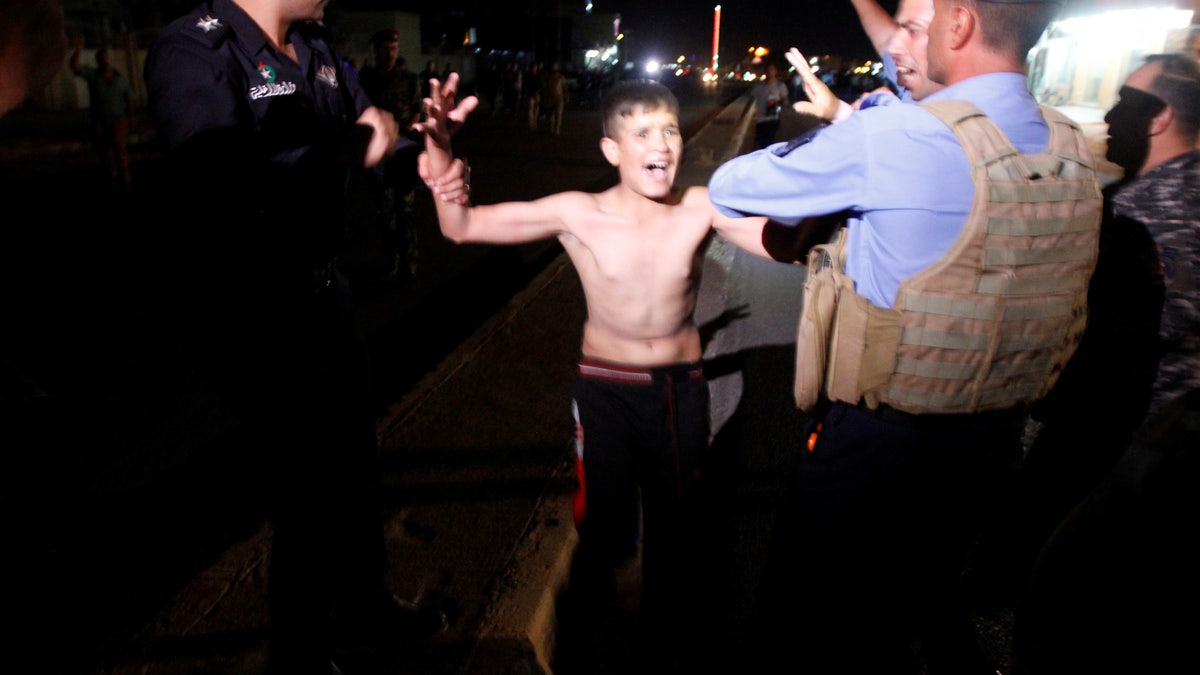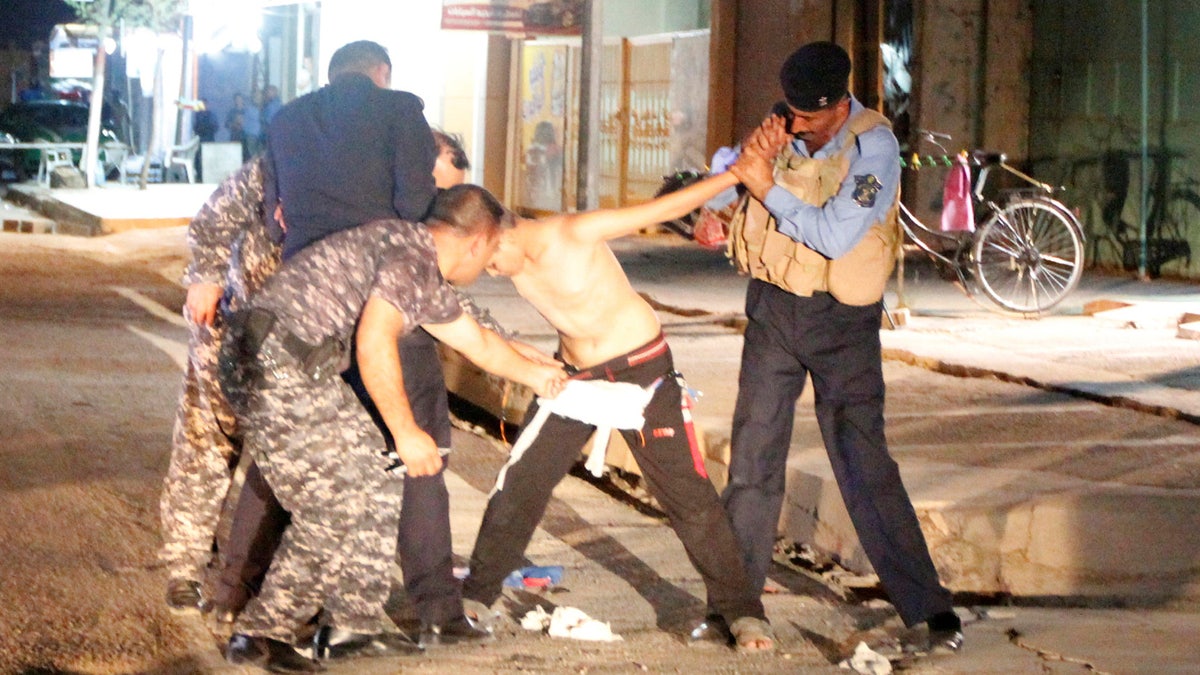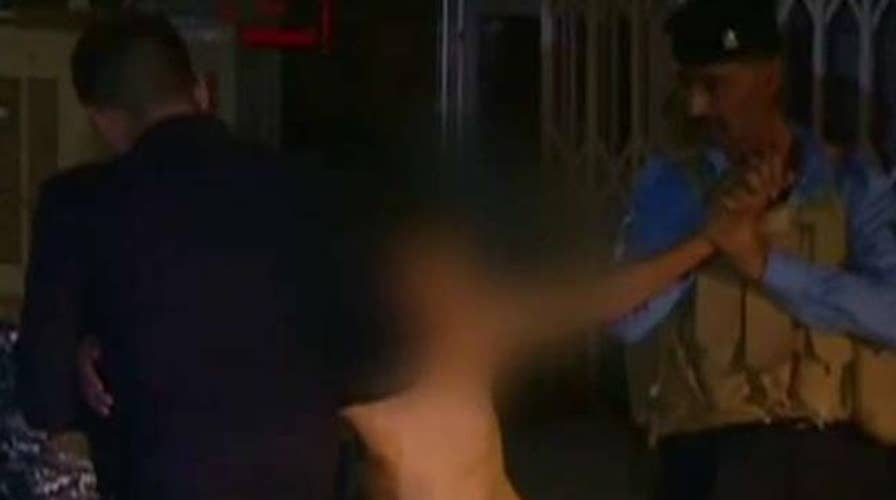Dramatic photos Monday showed police in Iraq arresting a boy and uncovering an explosive belt around his waist, as the child reportedly claimed terrorists kidnapped him and forced him to blow himself up.
The arrest took place two days after a bomber detonated explosives at a wedding party in southeastern Turkey, killing at least 54 people on behalf of the Islamic State terror group. President Recep Teyyip Erdogan said Sunday the killer was between 12 and 14 years old, but Prime Minister Binali Yildirim said Monday it wasn't clear whether the bomber was a child or an adult.

Iraqi security forces detaining the boy in Kirkuk. (REUTERS/Ako Rasheed)
ISIS claimed responsibility for a separate blast Monday at a Shiite mosque in Kirkuk, Iraq, but made no mention of the child. Still, the group controls an army of child soldiers, which it calls "cubs of the caliphate," and seeks to re-educate children at ISIS-run schools, drugging some of them and indoctrinating them with the group's own radical version of Islam, according to analysts.
Local footage aired on Kurdistan 24 TV showed a group of police officers in Kirkuk holding the young boy while two men cut off a belt of explosives. After they removed the belt, officers rushed the boy into a police truck and drove away. The child's exact age was unclear.
The boy was apprehended on Sunday night, less than an hour after the mosque attack, Kirkuk police department spokesman Col. Avrasiya Kamil Wais told The Associated Press. In the mosque attack, only the bomber died and two people were wounded.
"The boy claimed during interrogation that he had been kidnapped by masked men who put the explosives on him and sent him to the area," Kirkuk intelligence official Brig. Chato Fadhil Humadi said.
ISIS previously has drugged its fighters to give them jolts of energy and eliminate any feelings of pain, a Peshmerga official told FoxNews.com earlier this year. "The fighters take the drug and they don't know where they are or what they are doing. They are just shooting and fighting," the official near the Mosul Dam said. "They lose their minds. Some can be shot 20 times before they go down."
The terror group commonly exposes children to violent acts, including beheadings, as part of a concerted effort to build a new generation of militants, analysts add. ISIS videos have shown boys killing the terror group's opponents through beheadings and shootings.

Iraqi security forces removing explosives from the boy in Kirkuk. (REUTERS/Ako Rasheed)
The boy, Humadi added, was displaced from ISIS-held city of Mosul, Iraq's second-largest city, by recent military operations in the area. He arrived in Kirkuk a week ago, Humadi said.
ISIS has deployed child suicide bombers to stage attacks in both Iraq and Syria. Among the most deadly attacks was a bombing at a youth soccer game at a stadium south of Baghdad on March 25, 2016. A bomber -- believed be a teenager -- detonated his explosives as officials were handing out trophies to players after the tournament, killing 29 and wounding 60. ISIS released a photo of the attacker in which he appears to be no more than 16 years old. Nearly half of those killed were also children, participating in the soccer game or cheering from the stands.
The U.N.'s children's agency, UNICEF, said in a recent report that thousands of children have been abducted in Iraq. Girls, the group says, are at greatest risk of being sold into sexual slavery while boys are often forced into becoming combatants or suicide bombers.
Kirkuk, an oil rich city in Iraq's north is claimed by both Iraq's central government and the country's Kurdish region.
Kirkuk has seen a rise in ethnic tensions following the Islamic State group's blitz across northern and western Iraq in 2014. Iraqi security forces largely withdrew from Kirkuk and Kurdish forces known as the peshmerga took control of the city. Since then, Shiite militia fighters have also massed around the city.
The area is home to Arabs, Kurds and Turkmen who all have competing claims to the area. The Kurds have long wanted to incorporate the city into their semi-autonomous region, but Iraq's central government opposes this.
The Associated Press contributed to this report.

